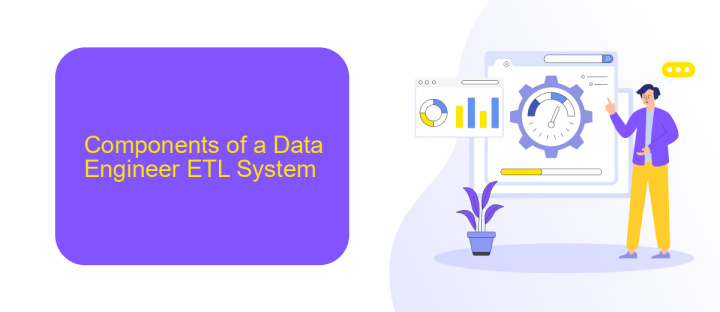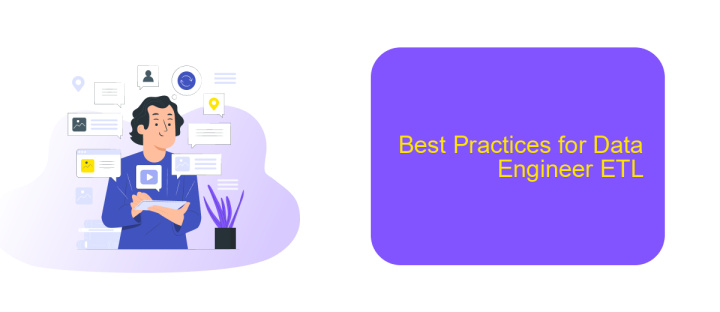Data Engineer ETL
In today's data-driven world, the role of a Data Engineer specializing in ETL (Extract, Transform, Load) processes is crucial. These professionals ensure the seamless flow of data from various sources to data warehouses and analytics platforms. By designing and maintaining efficient ETL pipelines, Data Engineers enable organizations to make informed decisions, optimize operations, and gain valuable insights from their data.
Introduction to Data Engineer ETL
Data Engineering is a critical field in the modern data-driven world. ETL (Extract, Transform, Load) is a fundamental process that enables the efficient movement and transformation of data from various sources to centralized data warehouses. Data Engineers play a pivotal role in designing, building, and maintaining these ETL pipelines to ensure data integrity and accessibility.
- Extract: Data is collected from multiple sources such as databases, APIs, and flat files.
- Transform: The extracted data is cleaned, enriched, and transformed into a suitable format for analysis.
- Load: The transformed data is loaded into a data warehouse or data lake for further use.
To streamline ETL processes, tools like ApiX-Drive can be utilized. ApiX-Drive offers seamless integration capabilities, allowing data engineers to automate data extraction and transformation from various platforms without extensive coding. This not only saves time but also reduces the risk of errors, ensuring a more reliable and efficient data pipeline.
Components of a Data Engineer ETL System

An effective Data Engineer ETL system comprises several key components. Firstly, data extraction tools are essential for gathering data from various sources such as databases, APIs, and flat files. These tools ensure that data is collected in a consistent and reliable manner. Secondly, transformation tools are used to clean, normalize, and enrich the extracted data. This step often involves the application of business rules, data validation, and aggregation to ensure that the data is in a usable format for analysis.
Another critical component is the data loading mechanism, which moves the transformed data into a target storage system, such as a data warehouse or data lake. Additionally, integration services like ApiX-Drive can be utilized to streamline the process of connecting different data sources and automating data workflows. These services help in reducing manual efforts and improving the overall efficiency of the ETL process. Monitoring and logging tools are also important to track the performance and health of the ETL pipelines, ensuring data integrity and timely issue resolution.
The ETL Process

The ETL (Extract, Transform, Load) process is a fundamental workflow in data engineering, enabling the efficient movement and transformation of data from various sources into a centralized data warehouse. This process ensures that data is accessible, reliable, and ready for analysis and reporting.
- Extract: Data is collected from multiple sources, such as databases, APIs, and flat files. This step involves connecting to these sources and retrieving the raw data.
- Transform: The raw data is cleaned, filtered, and transformed into a suitable format. This may involve data normalization, aggregation, and enrichment to ensure consistency and accuracy.
- Load: The transformed data is then loaded into a target data warehouse or data lake. This step ensures that the data is structured and stored in a way that supports efficient querying and analysis.
Tools like ApiX-Drive can simplify the ETL process by automating the integration and data transfer between various systems. ApiX-Drive allows for seamless connectivity and data synchronization, reducing manual effort and minimizing errors. By leveraging such tools, organizations can streamline their ETL workflows and focus on deriving actionable insights from their data.
Best Practices for Data Engineer ETL

To excel as a Data Engineer in ETL processes, it's crucial to follow best practices that ensure data integrity, scalability, and efficiency. Start by understanding the business requirements and data sources thoroughly. This will help in designing a robust ETL pipeline that meets the organization's needs.
Data quality is paramount. Implement data validation checks at each stage of the ETL process to catch errors early. Utilize tools and frameworks that support data profiling and cleansing to maintain high data standards.
- Automate ETL workflows using reliable tools like Apache Airflow or AWS Glue.
- Ensure data security by encrypting sensitive information and managing access controls.
- Leverage incremental data loading to optimize performance and reduce load times.
- Monitor and log ETL processes to quickly identify and resolve issues.
- Utilize integration services like ApiX-Drive to seamlessly connect various data sources and automate data flows.
Regularly review and update your ETL processes to adapt to changing business needs and technological advancements. Continuous learning and staying updated with industry trends will help you maintain efficient and effective ETL pipelines.
Conclusion
In conclusion, the role of a Data Engineer in the ETL process is critical for ensuring the seamless flow of data within an organization. By designing, implementing, and managing robust ETL pipelines, Data Engineers enable businesses to transform raw data into valuable insights that drive decision-making and strategic initiatives. Their expertise in handling large datasets, optimizing data workflows, and ensuring data quality is indispensable in today's data-driven landscape.
Furthermore, leveraging integration services like ApiX-Drive can significantly enhance the efficiency of ETL processes. ApiX-Drive offers a versatile platform for automating data transfers between various systems, reducing the manual effort required and minimizing the risk of errors. By utilizing such tools, Data Engineers can focus more on optimizing data architecture and less on routine data integration tasks, ultimately contributing to more agile and responsive data operations. As the demand for data-driven insights continues to grow, the importance of skilled Data Engineers and advanced integration solutions will only become more pronounced.
FAQ
What is ETL in the context of Data Engineering?
What skills are essential for a Data Engineer working with ETL processes?
How can automation improve ETL processes?
What are some common challenges in ETL processes?
How can ApiX-Drive help in setting up ETL processes?
Apix-Drive will help optimize business processes, save you from a lot of routine tasks and unnecessary costs for automation, attracting additional specialists. Try setting up a free test connection with ApiX-Drive and see for yourself. Now you have to think about where to invest the freed time and money!

